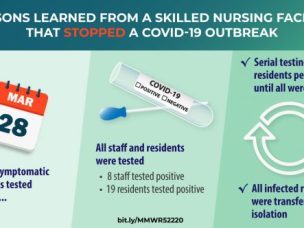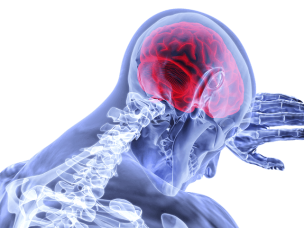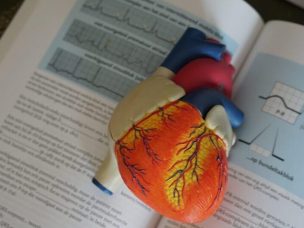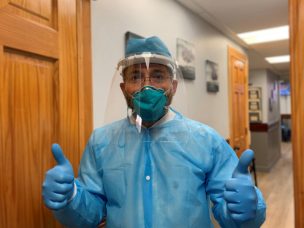May 2020
CDC Releases Resources to Assist States in Reopening
Written by the U.S. Department of Health and Human Services Across America, states and localities are experiencing different phases of the COVID-19 pandemic. Many have chosen to begin moving gradually and strategically toward resuming civic life. To help states, tribes, localities, and territories, as well as businesses and community organizations, operate as safely as possible...
Universal and Serial RT-PCR Testing in SNFs Can Identify Cases During an Outbreak, and Rapid Isolation and Cohorting Can Help Interrupt Transmission.
Written by the CDC Summary What is already known about this topic? Long-term care skilled nursing facilities (SNFs) are at high risk for COVID-19 outbreaks. Many SNF residents and staff members identified with COVID-19 are asymptomatic and presymptomatic. What is added by this report? After identification of two cases of COVID-19 in an SNF in...
The Silent Epidemic: Why are Black Expectant Mothers Dying at an Alarming Rate?
Written by Dr. Gina Charles The numbers are staggering. Each year, the U.S. continues to drop the ball when it comes to maternal mortality. Amongst industrial nations, the U.S. ranks number 1 with maternal related deaths and complications. The stats are even more egregious when we talk about expectant black mothers. Since 1987, the maternal mortality...
Diabetes Could Worsen Brain Function After A Stroke
Having Type 2 diabetes could cause cognitive impairment in stroke survivors, according to new research that points out the need to aggressively treat prediabetes. A new analysis of seven international studies found that three to six months after a stroke, the participants with diabetes functioned worse than those without diabetes on measures for memory, attention,...
After A Heart Attack: Can Home Health Help Prevent Hospital Return?
By American Heart Association NewsHeart attack survivors who receive home health care are less likely to be readmitted to the hospital within the first month, according to preliminary research. The study, presented Friday at the American Heart Association’s Quality of Care & Outcomes Research Scientific Sessions, used the Nationwide Readmission Database to identify more than 400,000...
CDC Advisory: Multisystem Inflammatory Syndrome in Children (MIS-C) Associated with Coronavirus Disease 2019 (COVID-19)
Advisory courtesy of the CDC On April 26, 2020, clinicians in the United Kingdom (UK) recognized increased reports of previously healthy children presenting with a severe inflammatory syndrome with Kawasaki disease-like features.1 The cases occurred in children testing positive for current or recent infection by SARS-CoV-2, the novel coronavirus that causes COVID-19, based on reverse-transcriptase...
NYC Cardiologist Survives COVID-19 & Helps Hispanics Fight The Virus
By American Heart Association News New York City cardiologist Dr. Samer Kottiech became a “hardcore COVID expert” the hard way. He developed symptoms he didn’t immediately recognize as COVID-19: redness and pain on the small toes of his left foot and his index finger. Chills and severe muscle aches presented two days later, followed by...
Possible Stroke and COVID-19 Connection Considered By Doctors
By American Heart Association News The first thing to know about the possible links between COVID-19 and stroke is simple, say doctors: We just don’t know. “We have very serious worries that there’s a connection,” said Dr. Patrick D. Lyden, professor of neurology at Cedars-Sinai Medical Center in Los Angeles. “But I want to make...
Socioeconomic Conditions Added Causation For Peripheral Artery Disease
In the United States alone the cost of care for patients with Peripheral Artery Disease (PAD) has surpassed over 20 billion dollars as published in a study in 2018. These costs are associated with the increasing burden on patients with repeated Physician’s office visits, lost wages, recurring hospital admissions, surgical procedures, care by family members,...








